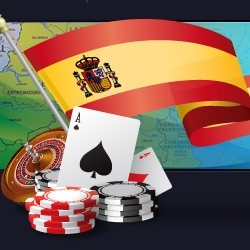43% of Spanish Online Poker Players Choose Illegal Sites

In 2011, Spain created a regulated igaming industry which ring-fenced its online poker players from other European countries and allowed Spanish residents to play on dot-es websites licensed by Spanish regulator Dirección General de Ordenación del Juego (DGOJ).
A few years later and the country’s online poker market has not produced the kind of results touted ahead of legalization, and a recent report released by Spain’s CODERE Foundation and the Institute of Policy and Governance of the Charles III University may provide the reason why. According to the report entitled ‘Social Perception on Gambling in Spain in 2014’ a staggering 43% of the country’s online poker players have opted, instead, to gamble on illegal, unregulated sites. As CODERE said:
“Forty-three percent of online players admitted doing so on websites that are not regulated by the Directorate General for the Regulation of Gambling (DGOJ), and approximately 12.8% declared to never use a dot-es website for their games. Which means that they play exclusively on illegal sites.”
Market suffers decline since regulation
The Spanish market may have reported a 9.2% YOY rise in online gaming revenues at €67.9 million ($92.4 million) for Q1 2014, but according to the DGOJ sports betting was mostly responsible for the increase and accounted for 55.4% of total gross gaming revenue or €37.6 million. Online poker, on the other hand, represented just 26% of the total market worth €17.7 million, while casino games generated a mere 13.1%.
The disappointing numbers are partly due to the financial crisis which has led online gamblers to play less often, in addition to a “mature” online gambling market which has witnessed an overall fall in the number of online gamblers. According to the latest report, for instance, leisure spending on gambling dropped from 9.4% to 7.7% between 2012 and 2013, while the number of Spanish online gamblers dropped 1.1% to 1,150,000 last year.
Regulated sites versus illegal sites
Instead of creating a pan-European online poker market combining the markets of such countries as Spain, Italy and France, the individual states opted to protect their nascent industries by ring fencing their individual players. As a result regulated online poker traffic plummeted in those countries, and as French poker pro Julien “JunkyBoy” Ferey, explains:
“Regulars represent one of the most important components for a poker room: if they start to play less, the room starts to suffer. Profits start becoming smaller, and this usually reflects in smaller tournament guarantees..We don’t have many of those ‘whales’ that used to make many good players quite happy in the past. Right now there are a lot of experienced foreign players on dot-fr tables, and this means that the level got higher and making money is not as easy as it used to be.”
Just like in Spain, 47% of France’s poker players have found it more profitable gambling, instead, on illegal poker sites where pros are still more likely to encounter the diversity of players needed to create a viable poker ecosystem. Furthermore, many Spanish players said that they paid little attention to current Spanish regulation, with 27.4% of interviewees saying they had no idea where the websites were based, and 43.8% saying they “believed the companies may be located in Spain.”
No good news ahead
In spite of general consensus amongst poker operators and player alike that merging the Spanish, Italian, and French poker markets gave the industry its best chance of success, there is unlikely to be any movement in that direction anytime soon. The French national parliament, for instance, has already expressed its opposition to the country joining an international poker market in the strongest possible terms, with Rapporteur of the Committee on Economic Affairs Razzy Hammadi, stating that “this would turn online poker into an uncontrollable ogre eating one market after the other.”
Meanwhile, online poker players in Spain are currently forced to either seek offshore sites, or play at one of the country’s three biggest sites, namely PokerStars.es with an average of 1,150 cash game players over a seven-day period, 888poker.es (325) or PartyPoker.es with just 65 players.
PokerStars granted gambling license in Spain
Recently PokerStars agreed to be bought out by Amaya for $4.9 billion, after which the company announced it intended to add casino games to its poker offering. The next day, PokerStars’ Spanish subsidiary obtained a license to offer Blackjack and Roulette from DGOJ, a move described by a PokerStars representative as meeting the “competitive realities of each market.”
In other words, poker may indeed have reached its saturation point and online casino games are increasingly being seen as the way forward for online operators. This point is not lost on the USA’s nascent online poker markets, either, and as Sarah Coffey explained on ifrahonigaming.com, recently:
“Some states considering poker-only legislation view it as a test run to see how the well the state can implement online gaming safely and responsibly before adding casino games to the mix. Nevada and Pennsylvania have said that they see online poker as a potential first step into online gaming rather than a final one. We believe that many poker-only states will find themselves adding casino games down the line when they see how much potential revenue they’re leaving on the table.”







